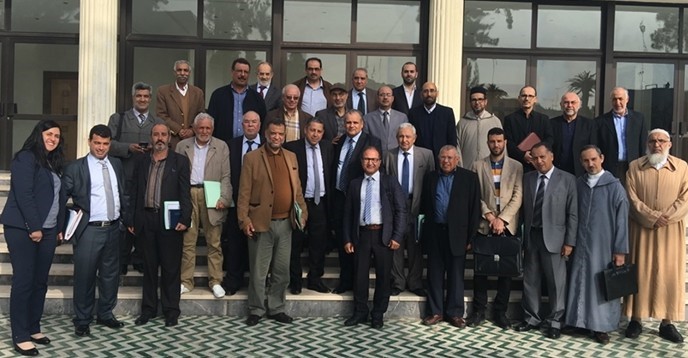Cherki El Hamdani,
former Chief Division to the curricula Direction of the Moroccan Education
Ministry, took part in the elaboration of UNESCO’s toolkit for
the revision of teaching programs, textbooks and other learning materials. The toolkit
was developed to contribute to the achievement of the SDG 4.
In a world of
multimedia, what is the importance of textbook revision?
Multimedia has overrun
our lifestyle. Scientific and technological innovations infringe on every
sectors, education and teaching are not spared. Textbooks, an essential tool
for teachers and learners are meant to be enhanced, either in format or in
content.
I think that the
permanent revision - on digital supports - allows correction to be simplified,
newer and contents that are more relevant can be increased while developing a
pedagogical approach that stimulates active learning. Textbooks will be
provided, with texts, pictures, audio/video supports…it will certainly spark
more desire to learn among the students.
How can textbook
revision be aligned with the Sustainable Developments Goal 4 - Target 4.7?
The Toolkit developed
by UNESCO, on which I brought my expertise, shows how to create interactions
between a teacher and a stereotype/prejudice-free learning. This is made
possible thanks to the critical review of textbooks, implementation of an
inclusive education, the wide spreading of the guides, along training workshops.
The Toolkit is meant
for those who are interested in education and development. It is particularly
helpful for all the actors of education, which I could describe more in depth
here.
On the one we have the
Policy-makers elaborate education policies and school-program designers can
implement the policies required to promote peace, equality and social cohesion
in contexts of development and education.
Then, I could talk to
you about the Program-designers will be able to use the guide in order to define
criteria for the conception of basic textbooks as well as additional teaching
materials, while the teachers may use the guide in order to analyze current
texts and recommend revision for the next editions. To finish, the editors may
use the guide for each step of the text elaboration, from the conception to the
final product, which include the updates of current editions.
How can the UNESCO
toolkit help both decision makers and teachers?
The supreme council of
Education, formation and scientific research of Morocco has elaborated a
strategic vision “For a school of equity, quality and promotion 2015-2030”.
The Sustainable Development Goal 4 and target 4.7 in
particular, are on the pillars of this vision that a recommendation consists in
I quote, ‘’the integration of “values and rights” approach in curricula,
programs and didactical resources […] the strengthening of gender equality
education and the struggle against discrimination, stereotypes and the negative
depictions of women within program and textbooks”.
I would like you to
remember that the Ministry of Education has implemented specialized authorities
in the monitoring sector of values aspects and promoting inclusive education of
human rights values through curricula, textbooks and other teaching materials.
We may mention among those structures: the permanent committee of programs, the
values committee, the central unit of Human Rights education. It is in this
field, that the curriculum directorate organized a workshop on April 12, 2017
in which the UNESCO Toolkit, in particular the guide entitled "Making
textbook content inclusive: a focus on religion, gender and culture" were
introduced, tested and reviewed by the actors in the sector of curricula and
textbooks. This meeting allowed to inform, to sensitize and to train different
stakeholders to inclusive content issues concerning culture, religion and
gender in these new textbooks production.
On that note, I am
glad to announce that the revision of several textbooks is ongoing, and aim at
deleting every message deemed radical, discriminatory, sexist or even violent.
New textbooks concerned by this operation will be operational for the year 2017-2018.
This interview was
done last April in Rabat during a workshop entitled “Making textbooks content
inclusive: culture, History and religion”, held by the Moroccan Education
Ministry.
The audio version of the interview is
available through podcast in French and in Arabic.
UNESCO’s toolkit is
composed of the following guides:
- Making textbook content inclusive: a
focus on religion, gender and culture
- Textbooks and learning Resources: A
Global Framework for Policy Development
- Textbooks and Learning Resources:
Guidelines for Developers and Users
- Online Annotated Bibliography on Textbook
Development
- UNESCO Guidebook on Textbook Research and
Textbook Revision
- Promoting Gender Equality through Textbooks: A Methodological Guide


